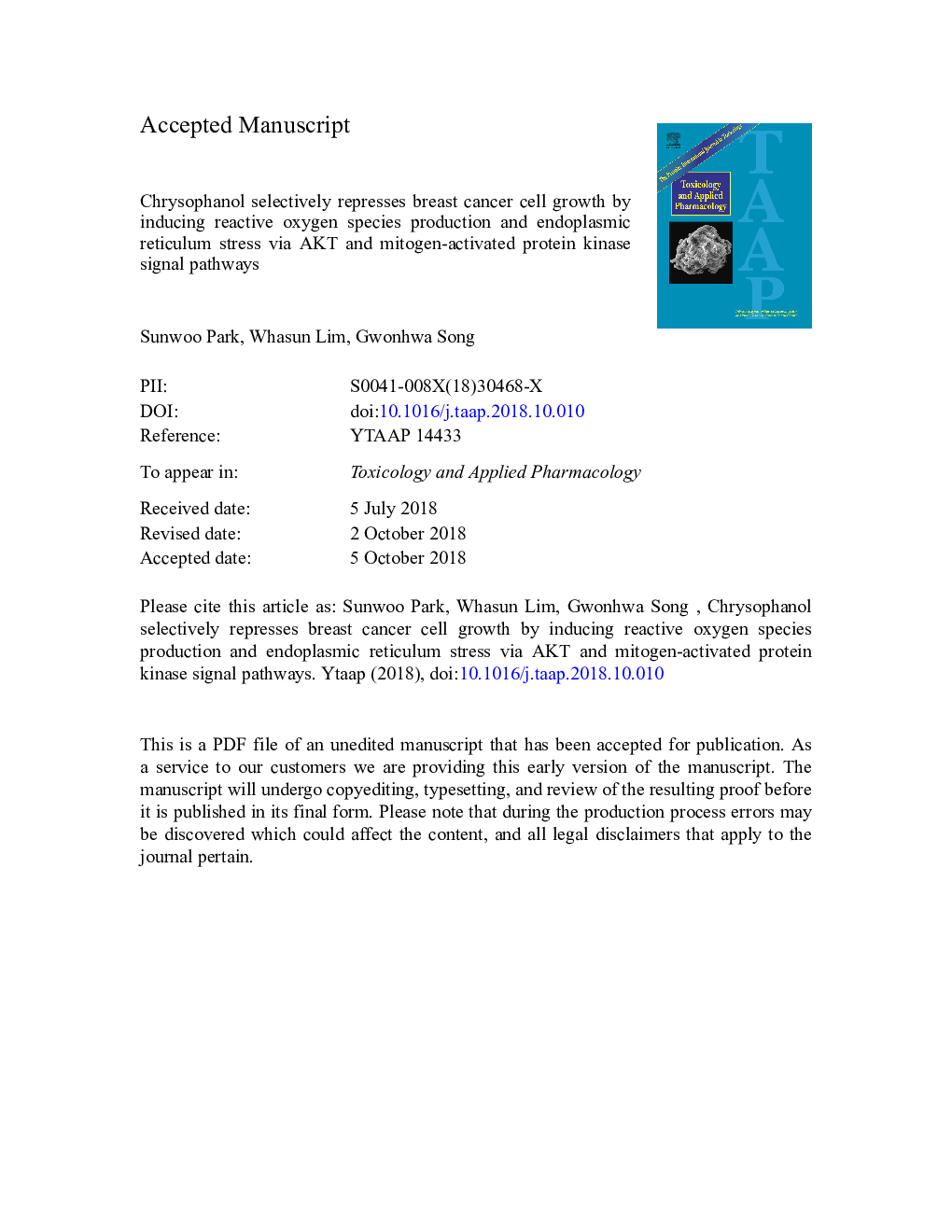| کد مقاله | کد نشریه | سال انتشار | مقاله انگلیسی | نسخه تمام متن |
|---|---|---|---|---|
| 11023054 | 1701347 | 2018 | 31 صفحه PDF | دانلود رایگان |
عنوان انگلیسی مقاله ISI
Chrysophanol selectively represses breast cancer cell growth by inducing reactive oxygen species production and endoplasmic reticulum stress via AKT and mitogen-activated protein kinase signal pathways
دانلود مقاله + سفارش ترجمه
دانلود مقاله ISI انگلیسی
رایگان برای ایرانیان
کلمات کلیدی
موضوعات مرتبط
علوم زیستی و بیوفناوری
علوم محیط زیست
بهداشت، سم شناسی و جهش زایی
پیش نمایش صفحه اول مقاله

چکیده انگلیسی
Breast cancer is a leading lethal gynecological cancer. Although many tumor markers and target genes have been studied in breast cancer, its incidence is increasing. Recently, the therapeutic effects of natural phytochemicals have been studied in various cancers as adjuvants. Chrysophanol is an anti-inflammatory, anti-angiogenetic, and anti-tumor anthraquinone but has not been widely studied in cancers. Here, we verified the anti-cancer effects and cellular mechanism of chrysophanol in human breast cancer cells (BT-474 and MCF-7). Chrysophanol selectively inhibited cell proliferation and induced apoptosis of breast cancer cells but not of normal mammary ductal epithelial cells, MCF-12A. Additionally, chrysophanol increased loss of mitochondrial membrane potential and cytosolic calcium levels to activate pro-apoptotic proteins, Bax, Bak, and cytochrome c, in both cell lines. Reactive oxygen species (ROS) overproduction by chrysophanol resulted in endoplasmic reticulum (ER) stress, leading to an increase in PERK, eIF2α, GADD153, and IRE1α levels in BT-474 and MCF-7 cells. These ER stress proteins increased by chrysophanol were repressed by co-treatment with N-acetyl-L-cysteine, an ROS inhibitor. Western blotting showed that chrysophanol down-regulated ERK1/2, AKT, P70S6K, and S6 in both cell lines. However, P38 and JNK activities decreased in BT-474 cells and increased in MCF-7 cells. Additionally, co-treatment with ERK1/2 (U0126) or an AKT inhibitor (LY294002) plus chrysophanol reduced cell proliferation, whereas P38 (SB203580) and a JNK inhibitor (SP600125) showed synergic effects only in BT-474 cell lines. These results show that chrysophanol has anti-cancer effects on human breast cancer cells, specifically through mitochondrial apoptosis and ER stress induction.
ناشر
Database: Elsevier - ScienceDirect (ساینس دایرکت)
Journal: Toxicology and Applied Pharmacology - Volume 360, 1 December 2018, Pages 201-211
Journal: Toxicology and Applied Pharmacology - Volume 360, 1 December 2018, Pages 201-211
نویسندگان
Sunwoo Park, Whasun Lim, Gwonhwa Song,